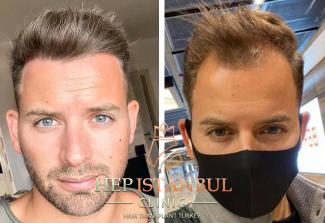## Hair transplant operations: Are the results always satisfactory?
### introduction
Hair transplantation is considered one of the effective solutions for treating hair loss and baldness. These operations include multiple techniques aimed at moving hair follicles from a donor area (usually the back of the head) to a recipient area (usually the front of the head or areas suffering from hair loss). But the important question is: Are the results always satisfactory? This article reviews the various factors that affect patient satisfaction with the results of hair transplant operations.
### Factors affecting patient satisfaction
1. **Patients’ expectations**:
– Unrealistic expectations that can lead to disappointment, even if the operation is technically successful.
– It is essential that patients have realistic expectations and talk openly with their surgeon about what can be achieved.
2. **Surgeon’s skill and experience**:
The experience and skill of the surgeon are considered one of the main factors in the success of the operation.
– An experienced surgeon can ensure that the hair follicles are distributed normally and reduce the risk of complications.
3. **Type of technology used**:
– There are different techniques such as FUT (strip transplantation) and FUE (follicular unit extraction).
Each technique has advantages and disadvantages, and choosing the appropriate technique depends on the patient’s condition and needs.
4. **Donor area quality**:
The quality and quantity of hair in the donor area greatly affects the final results.
– If the donor area is rich in thick hair, the results are usually better.
5. **Post-operative care**:
– Following post-operative instructions plays an important role in the success of the operation.
– Failure to adhere to care instructions can lead to problems such as infection or loss of the transplanted hair.
6. **Patient’s health factors**:
The health of the scalp and the patient’s general health affect the success of the operation.
Factors such as smoking, autoimmune diseases, and diabetes may affect wound healing and growth of transplanted hair.
### Cases in which the results may be unsatisfactory
1. **Unrealistic expectations**:
Expecting to have very thick hair in a short period is unrealistic.
– Results appear gradually and require patient patience.
2. **Continuous hair loss**:
– Some patients suffer from persistent hair loss, which requires additional operations.
-Continuous loss can affect the appearance of the transplanted hair.
3. **Surgical complications**:
– Complications such as infections or scarring may affect the final results.
It is necessary to choose a reliable and specialized medical center to reduce these risks.
### Conclusion
Hair transplants are often satisfactory for many patients, especially if the procedure is performed by an experienced surgeon and using proper technique. However, patients should be aware of realistic expectations and factors that can affect results. Good communication with the surgeon and adherence to post-operative instructions can increase the chances of obtaining satisfactory results.

